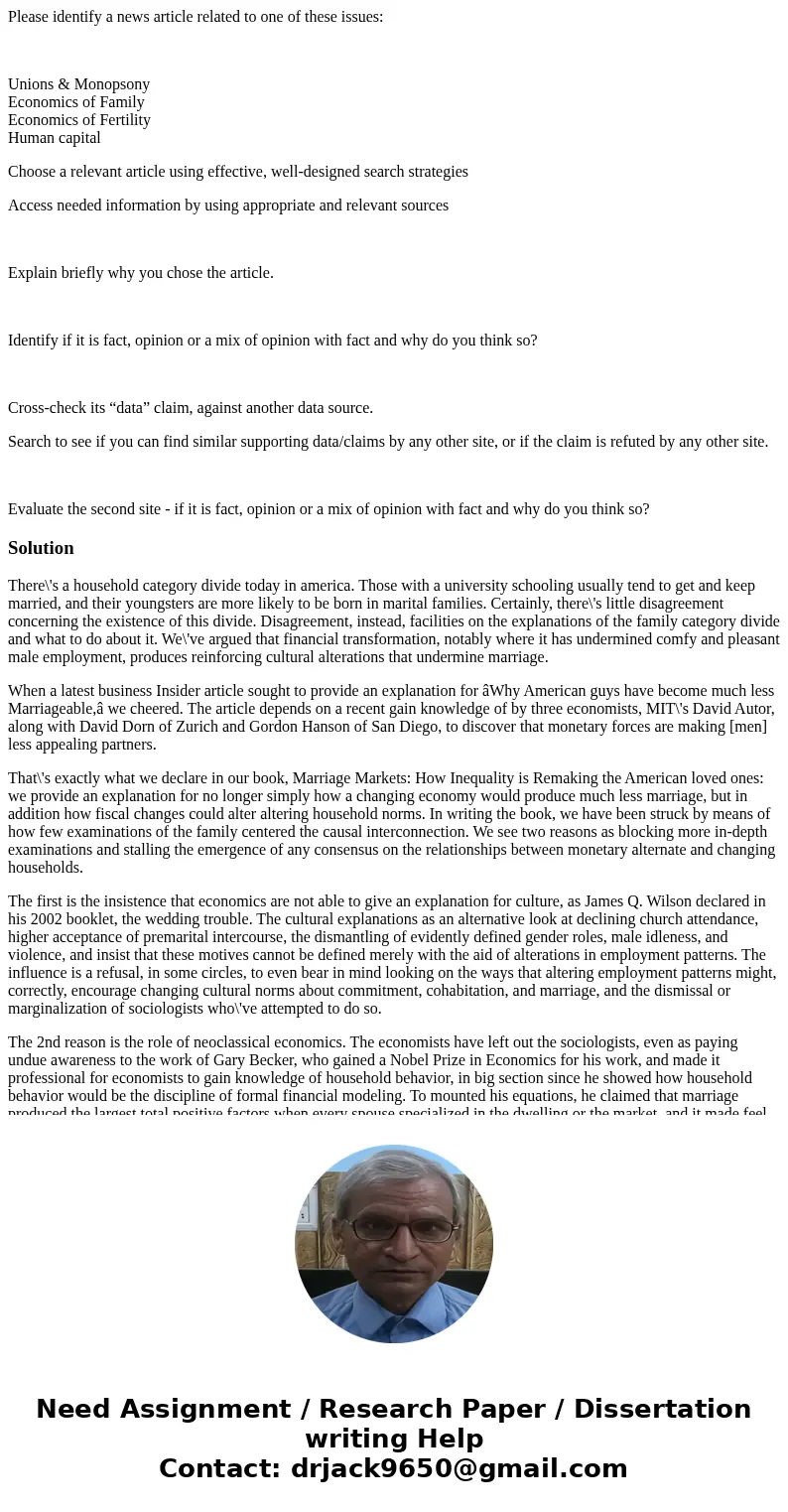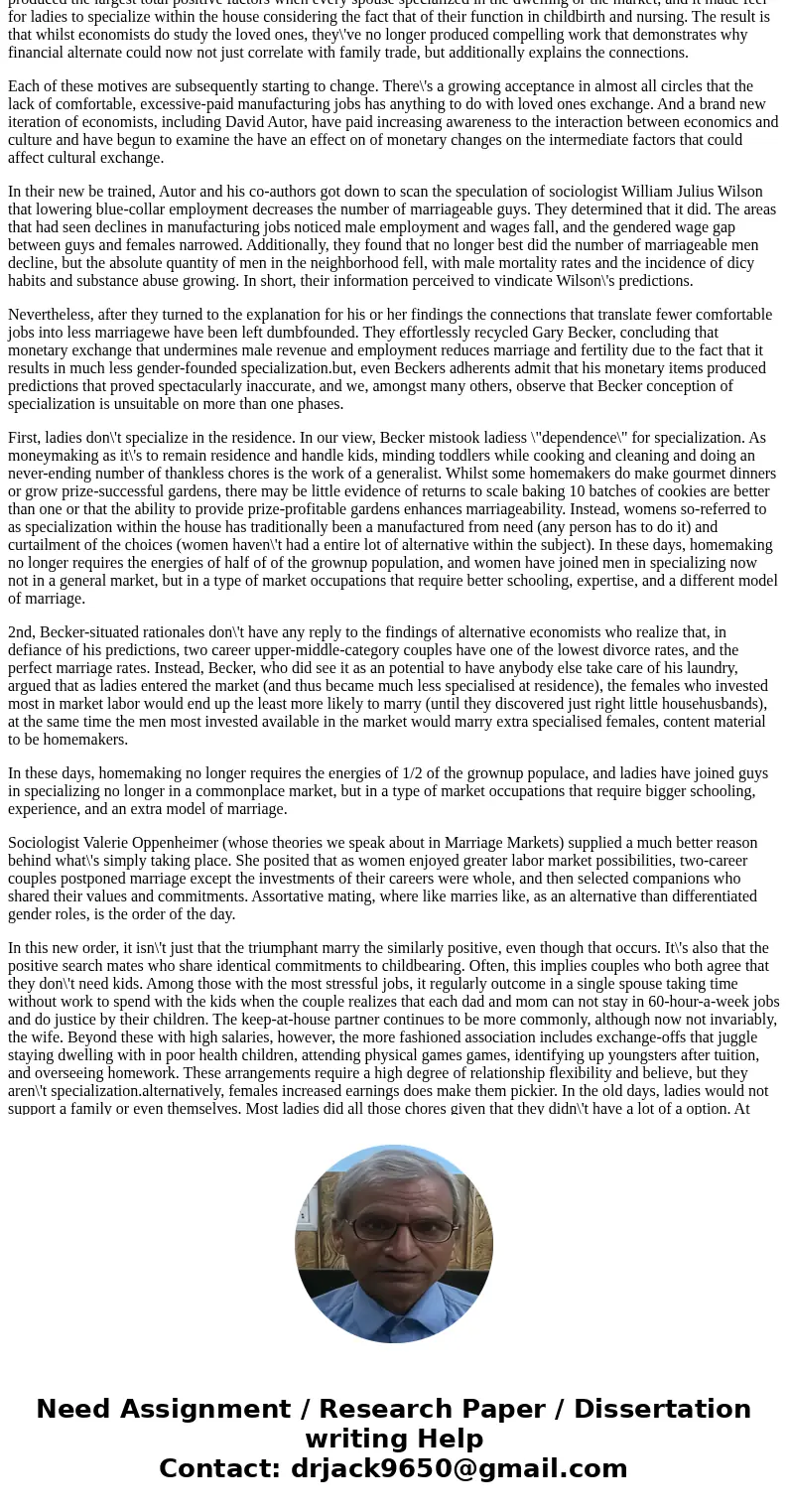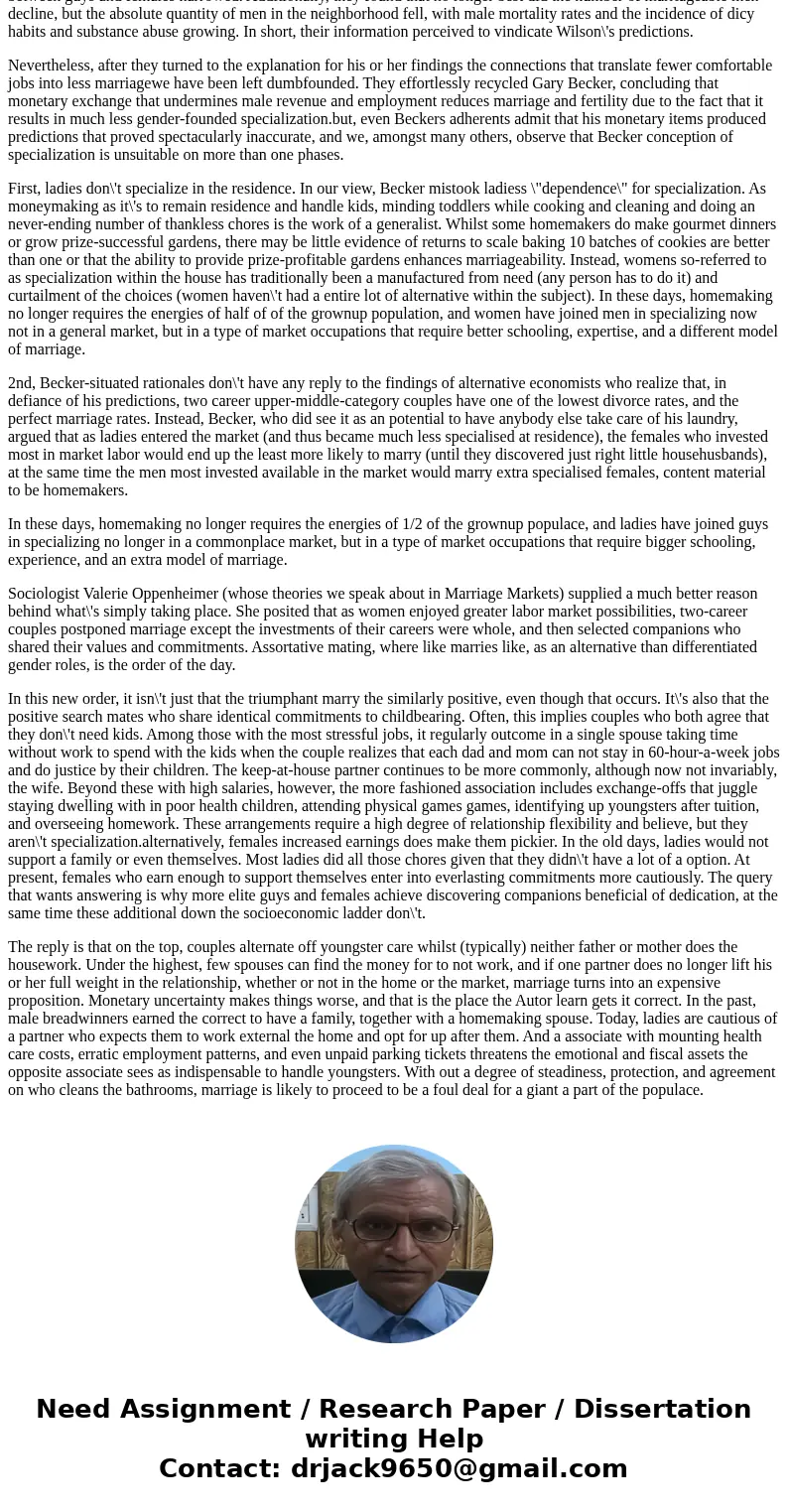Please identify a news article related to one of these issue
Please identify a news article related to one of these issues:
Unions & Monopsony
Economics of Family
Economics of Fertility
Human capital
Choose a relevant article using effective, well-designed search strategies
Access needed information by using appropriate and relevant sources
Explain briefly why you chose the article.
Identify if it is fact, opinion or a mix of opinion with fact and why do you think so?
Cross-check its “data” claim, against another data source.
Search to see if you can find similar supporting data/claims by any other site, or if the claim is refuted by any other site.
Evaluate the second site - if it is fact, opinion or a mix of opinion with fact and why do you think so?
Solution
There\'s a household category divide today in america. Those with a university schooling usually tend to get and keep married, and their youngsters are more likely to be born in marital families. Certainly, there\'s little disagreement concerning the existence of this divide. Disagreement, instead, facilities on the explanations of the family category divide and what to do about it. We\'ve argued that financial transformation, notably where it has undermined comfy and pleasant male employment, produces reinforcing cultural alterations that undermine marriage.
When a latest business Insider article sought to provide an explanation for âWhy American guys have become much less Marriageable,â we cheered. The article depends on a recent gain knowledge of by three economists, MIT\'s David Autor, along with David Dorn of Zurich and Gordon Hanson of San Diego, to discover that monetary forces are making [men] less appealing partners.
That\'s exactly what we declare in our book, Marriage Markets: How Inequality is Remaking the American loved ones: we provide an explanation for no longer simply how a changing economy would produce much less marriage, but in addition how fiscal changes could alter altering household norms. In writing the book, we have been struck by means of how few examinations of the family centered the causal interconnection. We see two reasons as blocking more in-depth examinations and stalling the emergence of any consensus on the relationships between monetary alternate and changing households.
The first is the insistence that economics are not able to give an explanation for culture, as James Q. Wilson declared in his 2002 booklet, the wedding trouble. The cultural explanations as an alternative look at declining church attendance, higher acceptance of premarital intercourse, the dismantling of evidently defined gender roles, male idleness, and violence, and insist that these motives cannot be defined merely with the aid of alterations in employment patterns. The influence is a refusal, in some circles, to even bear in mind looking on the ways that altering employment patterns might, correctly, encourage changing cultural norms about commitment, cohabitation, and marriage, and the dismissal or marginalization of sociologists who\'ve attempted to do so.
The 2nd reason is the role of neoclassical economics. The economists have left out the sociologists, even as paying undue awareness to the work of Gary Becker, who gained a Nobel Prize in Economics for his work, and made it professional for economists to gain knowledge of household behavior, in big section since he showed how household behavior would be the discipline of formal financial modeling. To mounted his equations, he claimed that marriage produced the largest total positive factors when every spouse specialized in the dwelling or the market, and it made feel for ladies to specialize within the house considering the fact that of their function in childbirth and nursing. The result is that whilst economists do study the loved ones, they\'ve no longer produced compelling work that demonstrates why financial alternate could now not just correlate with family trade, but additionally explains the connections.
Each of these motives are subsequently starting to change. There\'s a growing acceptance in almost all circles that the lack of comfortable, excessive-paid manufacturing jobs has anything to do with loved ones exchange. And a brand new iteration of economists, including David Autor, have paid increasing awareness to the interaction between economics and culture and have begun to examine the have an effect on of monetary changes on the intermediate factors that could affect cultural exchange.
In their new be trained, Autor and his co-authors got down to scan the speculation of sociologist William Julius Wilson that lowering blue-collar employment decreases the number of marriageable guys. They determined that it did. The areas that had seen declines in manufacturing jobs noticed male employment and wages fall, and the gendered wage gap between guys and females narrowed. Additionally, they found that no longer best did the number of marriageable men decline, but the absolute quantity of men in the neighborhood fell, with male mortality rates and the incidence of dicy habits and substance abuse growing. In short, their information perceived to vindicate Wilson\'s predictions.
Nevertheless, after they turned to the explanation for his or her findings the connections that translate fewer comfortable jobs into less marriagewe have been left dumbfounded. They effortlessly recycled Gary Becker, concluding that monetary exchange that undermines male revenue and employment reduces marriage and fertility due to the fact that it results in much less gender-founded specialization.but, even Beckers adherents admit that his monetary items produced predictions that proved spectacularly inaccurate, and we, amongst many others, observe that Becker conception of specialization is unsuitable on more than one phases.
First, ladies don\'t specialize in the residence. In our view, Becker mistook ladiess \"dependence\" for specialization. As moneymaking as it\'s to remain residence and handle kids, minding toddlers while cooking and cleaning and doing an never-ending number of thankless chores is the work of a generalist. Whilst some homemakers do make gourmet dinners or grow prize-successful gardens, there may be little evidence of returns to scale baking 10 batches of cookies are better than one or that the ability to provide prize-profitable gardens enhances marriageability. Instead, womens so-referred to as specialization within the house has traditionally been a manufactured from need (any person has to do it) and curtailment of the choices (women haven\'t had a entire lot of alternative within the subject). In these days, homemaking no longer requires the energies of half of of the grownup population, and women have joined men in specializing now not in a general market, but in a type of market occupations that require better schooling, expertise, and a different model of marriage.
2nd, Becker-situated rationales don\'t have any reply to the findings of alternative economists who realize that, in defiance of his predictions, two career upper-middle-category couples have one of the lowest divorce rates, and the perfect marriage rates. Instead, Becker, who did see it as an potential to have anybody else take care of his laundry, argued that as ladies entered the market (and thus became much less specialised at residence), the females who invested most in market labor would end up the least more likely to marry (until they discovered just right little househusbands), at the same time the men most invested available in the market would marry extra specialised females, content material to be homemakers.
In these days, homemaking no longer requires the energies of 1/2 of the grownup populace, and ladies have joined guys in specializing no longer in a commonplace market, but in a type of market occupations that require bigger schooling, experience, and an extra model of marriage.
Sociologist Valerie Oppenheimer (whose theories we speak about in Marriage Markets) supplied a much better reason behind what\'s simply taking place. She posited that as women enjoyed greater labor market possibilities, two-career couples postponed marriage except the investments of their careers were whole, and then selected companions who shared their values and commitments. Assortative mating, where like marries like, as an alternative than differentiated gender roles, is the order of the day.
In this new order, it isn\'t just that the triumphant marry the similarly positive, even though that occurs. It\'s also that the positive search mates who share identical commitments to childbearing. Often, this implies couples who both agree that they don\'t need kids. Among those with the most stressful jobs, it regularly outcome in a single spouse taking time without work to spend with the kids when the couple realizes that each dad and mom can not stay in 60-hour-a-week jobs and do justice by their children. The keep-at-house partner continues to be more commonly, although now not invariably, the wife. Beyond these with high salaries, however, the more fashioned association includes exchange-offs that juggle staying dwelling with in poor health children, attending physical games games, identifying up youngsters after tuition, and overseeing homework. These arrangements require a high degree of relationship flexibility and believe, but they aren\'t specialization.alternatively, females increased earnings does make them pickier. In the old days, ladies would not support a family or even themselves. Most ladies did all those chores given that they didn\'t have a lot of a option. At present, females who earn enough to support themselves enter into everlasting commitments more cautiously. The query that wants answering is why more elite guys and females achieve discovering companions beneficial of dedication, at the same time these additional down the socioeconomic ladder don\'t.
The reply is that on the top, couples alternate off youngster care whilst (typically) neither father or mother does the housework. Under the highest, few spouses can find the money for to not work, and if one partner does no longer lift his or her full weight in the relationship, whether or not in the home or the market, marriage turns into an expensive proposition. Monetary uncertainty makes things worse, and that is the place the Autor learn gets it correct. In the past, male breadwinners earned the correct to have a family, together with a homemaking spouse. Today, ladies are cautious of a partner who expects them to work external the home and opt for up after them. And a associate with mounting health care costs, erratic employment patterns, and even unpaid parking tickets threatens the emotional and fiscal assets the opposite associate sees as indispensable to handle youngsters. With out a degree of steadiness, protection, and agreement on who cleans the bathrooms, marriage is likely to proceed to be a foul deal for a giant a part of the populace.



 Homework Sourse
Homework Sourse